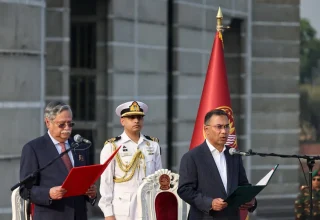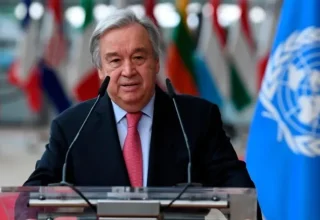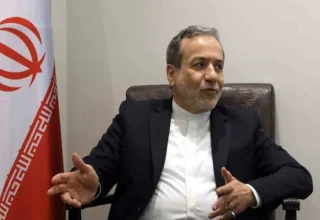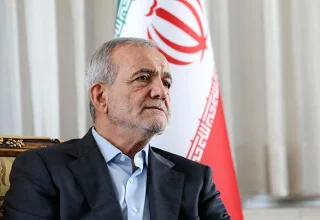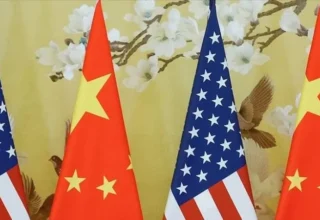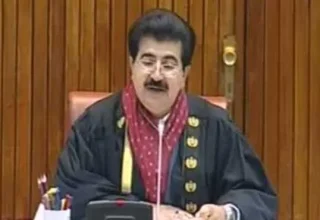
Senate Chairman Sadiq Sanjrani on Sunday “dropped” a bill aimed at curbing violent extremism after fierce opposition from lawmakers, including those from the ruling coalition.
According to the agenda for today’s session, Interior Minister Rana Sanaullah was supposed to table the bill titled ‘The Prevention of Violent Extremism Bill 2023’. However, many parliamentarians, including those from the ruling coalition, opposed the bill.
The bill said that those calling on others to show or use force, propagating and publishing extremist material, using all kinds of media for radicalization or manipulating people’s beliefs, or provoking sectarian strife would be guilty of violent extremism.
PTI’s Mohammad Humayun Mohmand said that he did not know why the bill was being tabled on Sunday. “Is there an emergency in Pakistan that we come and do this on Sundays, on public holidays?”
He went on to say that if such legislation was passed by following the due procedure, then it would only add to its credibility. “If we do something in haste just because the government thinks little time remains, then haste makes waste,” he said.
Climate Minister Sherry Rehman tried defending the holding of today’s session and said that in the past sessions had been called on Sundays and Saturdays. She also commented on the statements by other parliamentarians questioning why the bills on the agenda were not being referred to the relevant committees.
“Perhaps, they don’t know that when the National Assembly (NA) completes its term, the bills that originate from there […] the rule is that they become infructuous the day the assembly’s term ends,” she said.
Sherry said that the Senate could also introduce amendments to bills after the assembly’s term ended. “No one likes hasty legislation,” she said.
PML-N Senator Irfan Siddiqui then said that as a member of the ruling party, there was perhaps a “compulsion” that they would vote for the bills, adding that they would do so.
At the same time, he said that several of the bills on today’s agenda were “important”. Talking about the prevention of violent extremism bill, he said that it covered “vast areas”.
He pointed out that the bill had 33 articles and 100 sub-clauses, adding that these were applicable to all, including politicians and the common man.
Siddiqui pointed out that the bill did not come from the NA and had come directly to the Senate. “After coming to us directly, it is our responsibility to thoroughly look at it before sending it to the NA. We agree with its aims and objectives but we fear that if this bill is approved as it is without going to the committee […] then it may perhaps be difficult to escape its clutches in the future,” he said.
Subsequently, Minister of State for Law and Justice Shahadat Awan tabled the bill on behalf of the interior minister.
“Is it opposed?” asked Chairman Sanjrani, to which senators said it was. “Should I send it to the committee or take it to passage?” he then asked.
PTI’s Mohmand then said that this was an important bill that would have an effect on people’s lives. “But when I was perusing the bill, it seemed as if Rana Sanaullah [named] the bill to prevent violent extremism but maybe he wanted to prevent PTI from taking part in the next elections.”
He said that each clause “reeked” of targeting the PTI. He pointed out that members of the coalition were also opposing the bill and urged the Senate chairman to send it to the relevant committee as the bill would have “far-reaching effects”.
“If you want to do this then it is better to impose martial law or partial law. Why are we sitting here in Parliament?” he said.
Senator Kamran Murtaza of the Jamiat Ulema-i-Islam-Fazl (JUI-F) then said that any such legislation required taking allied parties into confidence. “You are cutting off your own hands with this legislation. You don’t realise it […] but where fundamental rights are being curtailed and you want to do legislation in this manner, in this haste and during the holidays, then I — as a coalition senator — voice my opposition.”
He said that the bill would become a problem down the line for all. “So please don’t do this kind of legislation which is offending the articles of the Constitution,” he said.
National Party (NP) Senator Tahir Bizenjo said that unfortunately two political parties, the PPP and the PML-N, were making all the decisions. He took issue with the PML-N, saying that they had not taken anyone into confidence over the legislation carried out over its tenure.
He said that the current bill was an “open attack” on democracy, adding that he was “strongly opposing the bill”. “If it is tabled, we will stage a token walkout,” he said.
Senate Chairman Sanjrani then said that the bill was a “routine matter” and today’s session was called because it was decided in the business advisory that the days needed to be completed and three holidays would not be counted.
“I drop this bill, whether or not the government does,” he said.
Before the Senate session began, PTI’s Sania Nishtar questioned the implications of the bill.
“Wide discretion and sweeping indemnity for the government. No independence of review process. Curbs on individual freedoms. Offences are non-bailable, cognizable and non-compoundable,” she said.
“What are the implications for human rights, right to fair trial, freedom of expression and chador aur char diwari values?” she asked.
JI Senator Mushtaq Ahmad said that today, the Pakistan Democratic Movement (PDM) government was presenting a bill on violent extremism.
“The government’s attitude is telling us that there are no plans to send it to the committee or discuss it and it will be passed today. This is a frightening bill which will not end violent extremism but will instead increase it,” he said.
The bill, titled “The Prevention of Violent Extremism Act 2023”, says that anyone found to be guilty of committing “violent extremism” may be listed in the Second Schedule of the Anti-Terrorism Act 1997 (ATA) or in the First Schedule in the case of an organisation.
The First and Second Schedules pertain to the proscription of organisations and persons found to be involved in terrorist activities, and those listed in them are to be kept under strict observation.
The bill defines that a person would be guilty of “violent extremism” if he “supports, encourages, promotes, instigates, foments, advocates, justifies, commits or threatens to commit the show or use of force or violence or any hostile action, not permitted under the law, for resolution of any ideological belief, or any political, sectarian, social, racial, ethnic and religious issue”.
Expanding upon it, the bill states that the offence includes:
- supporting, assisting and aiding in any manner, including financial support to any person or organisation concerned with violent extremism
- inciting others to show or use force, violence or hostility for the commission of violent extremism
- providing shelter, protection or harbouring any person already placed in the Schedule or who is subsequently found to be associated in any manner with violent extremism
- glorification of violent extremism and other offences under the laws of Pakistan and dissemination of information for said purposes
- propagating, disseminating, publishing or promoting violent sectarian ideologies, militant narratives, literature, or any other extremist material based on sectarian hatred through print, electronic, digital or social media or through any other means of communication, publication or broadcasting for creating disunity, turmoil, chaos, commotion or public disorder in the country
- disseminating any information in any manner with the objective to recruit persons, procure funding or in any manner to aid and support violent extremism
- using the electronic, print, social media or telecommunication network, in any manner for spreading any online content or material, for radicalisation, or manipulating peoples’ beliefs, conspiracy theories, self-induced narratives to glorify religion, hatred or discrimination against any class people or group, to overawe the government, to disrupt the public order or safety, or security and integrity of Pakistan or any part thereof
- provocation of religious or sectarian strife or hatred, associated with violence or calls for violence and the use of any religious practice, causing a threat to security, life, or fundamental rights and freedoms of general public
• any other action contrary to the provisions of the Third Schedule











